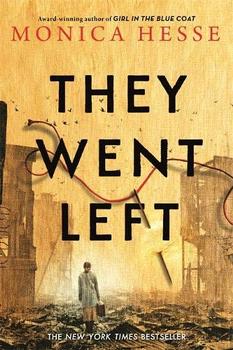Summary | Excerpt | Reading Guide | Reviews | Beyond the Book | Readalikes | Genres & Themes | Author Bio

Critics' Opinion:
Readers' Opinion:
First Published:
Apr 2020, 384 pages
Paperback:
Apr 2021, 384 pages
 Book Reviewed by:
Book Reviewed by:
Debbie Morrison
Buy This Book
Next," the official woman says. She's my mother's age, with lines on her brow that have only begun to soften her face. The queue behind me has grown, as more soon‑to‑be‑discharged patients come out. Another worker arrives to help.
The blond nurse, still watching me. "Did you forget anything else?" she asks. Urbaniak, I remember. Her surname is Urbaniak.
"My shoes. Where are my shoes?"
Why didn't I realize before? I've just looked down at my feet, and the brown leather boots I'm wearing are a stranger's.
"Those are your shoes. Your new shoes. Remember?" She's gentle, and then I do remember: These brown boots are mine now, because when I was brought to the hospital months ago, I was wearing the shoes the Nazis had assigned to me, ill-fitting and full of holes. My frostbitten feet were so swollen that a nurse couldn't pull them off; she had to slice them at the tongue. The nurses said I cried; I don't remember crying.
It turns out, if you have to lose toes to frostbite, the third and the fourth are possible to lose and still be able to walk and balance.
"Are you sure you don't want to stay longer, Zofia?"
"I remember about my shoes now; I just forgot for a minute."
"You had already asked me about them once today."
I force a smile.
"Dima is leaving; he's going to his new post, and he has a car to drive me." Dima-the-soldier is the one who brought me to the hospital, which was not a hospital then, just a building crammed with cots and bottles of iodine. Dima's Red Army jeep was crammed, too, with people. The Russians had liberated Gross-Rosen three days before, but it had finally become clear that none of us, including the Russian soldiers, knew what liberation was supposed to look like. Thousands of us were still inside the gates, too weak to leave. Dima found me barely conscious in the women's barracks, he later told me in the broken Polish from his mother. It was lucky I'd passed out, because by the time he stroked life back into my face, all the good rations had been handed out already: waxy chocolate, tinned beef.
Our stomachs were too weak for rich foods. I watched people who'd lived for months on a potato a day eat the beef and never get up again. We were liberated and still dying by the dozens.
"It's over now," the soldiers said to us in February. It wasn't over, not officially, not for a few months, but what they meant was, the SS officers were not coming back to the camp.
"It's really over now," the nurses told us in May, spoon-feeding us sugar water and porridge. We could hear cheering and yelling in the corridor; Germany had surrendered.
What did they mean, it was over? What was over? I was miles from home, and I didn't own so much as my own shoes. How was any of this over?
"Next," says the official woman, and I take another step forward.
A puff of smoke, the growl of a motor. Dima pulls up in his jeep. He leaps out when he sees me waiting, and I'm struck again by how much he looks like a cinema poster, like the film version of a soldier: Square chin. Nice cheekbones. Kind eyes. Dima, who postmarked my letters for me. Who, when I begged him, asked his soldier friends about Birkenau and found out for me that it had been liberated a month before Gross-Rosen. And who repeated the same thing for me again when I forgot, and then again when I forgot again. Remember, Zofia? We discuss already. My mind is a sieve, and Dima is how I am allowed to leave this place—because he is leaving with me.
"I would have come inside, Zofia." He places his hands on my shoulders. His hair is shorter above one ear. He must have cut it himself again in the mirror. "You get too tired. You know I worry about you."
"I have to stand in this line now."
"She has to be processed," Nurse Urbaniak explains. "The aid organizations are keeping records."
Excerpted from They Went Left by Monica Hesse. Copyright © 2020 by Monica Hesse. Excerpted by permission of Little, Brown Books for Young Readers. All rights reserved. No part of this excerpt may be reproduced or reprinted without permission in writing from the publisher.





The Flower Sisters
by Michelle Collins Anderson
From the new Fannie Flagg of the Ozarks, a richly-woven story of family, forgiveness, and reinvention.

The House on Biscayne Bay
by Chanel Cleeton
As death stalks a gothic mansion in Miami, the lives of two women intertwine as the past and present collide.

The Funeral Cryer by Wenyan Lu
Debut novelist Wenyan Lu brings us this witty yet profound story about one woman's midlife reawakening in contemporary rural China.
Your guide toexceptional books
BookBrowse seeks out and recommends the best in contemporary fiction and nonfiction—books that not only engage and entertain but also deepen our understanding of ourselves and the world around us.